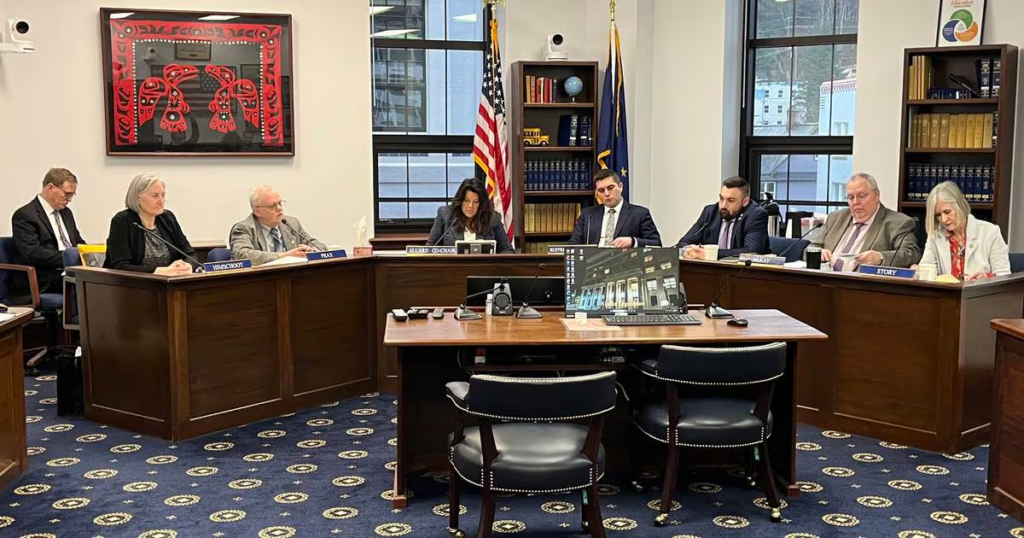The Alaska House endured an extensive session on Saturday, compelled by minority Democrats, who proposed numerous amendments on a bill aimed at safeguarding female athletes in the state’s public schools and universities.
In total, Democrats introduced 88 amendments, meticulously planned in caucus to prolong the passage of House Bill 183. Each amendment involved at least six Democrats advocating for it, aiming to tire out the Republican majority. With strict time limits for presentation and debate, the proceedings were expected to consume the entire day, leaving lawmakers feeling irritable.
Among the amendments was one seeking to exclude competitive chess tournaments from the proposed legislation protecting girls in sports. Subsequently, there was another amendment to exempt synchronized swimming teams from the protections for female athletes.
Regarding the chess amendment, Rep. Rebecca Himschoot of Sitka expressed her intention to vote for the bill, citing her viewing of “The Queen’s Gambit” on Netflix, which underscored the significance of chess to her. Himschoot, who previously taught science in public schools in Sitka and Hawaii, shared her newfound appreciation for the game.
On the synchronized swimming amendment, Rep. Donna Mears recounted her past involvement in synchronized swimming, during which she sustained a concussion. Despite her personal experience with a brain injury, she advocated for allowing males to participate on competitive teams alongside females.
One proposed amendment aimed to establish a “transgender awareness day” in schools and mandate the addition of curriculum materials highlighting notable transgender figures in history.
Another amendment addressed the issue of “hate crimes” targeting transgender individuals.
Yet another proposed amendment sought to adopt the NCAA policy as the benchmark for Alaska schools to adhere to. This policy is currently facing legal challenges from former NCAA champion swimmer Riley Gaines, who is now advocating for the rights of women athletes.
The House convened for the day’s session at 10 a.m. and remained in session until past 10 p.m., concluding with Amendment 88, during which Rep. Andy Josephson advocated for universal participation on any desired team.
At a certain juncture, House Minority Leader Calvin Schrage issued a warning to House Speaker Cathy Tilton, implying she would face repercussions in the future. Following a prolonged pause in the proceedings, he expressed regret for the threat.
Rep. Zack Fields exhibited disruptive behavior in the House, violating protocol by repeatedly interrupting the Alaska House Speaker, exceeding his allotted speaking time, and persisting in arguments despite his microphone being turned off. Additionally, he disregarded the institution’s decorum by reading passages without obtaining permission from the Speaker.
Rep. Daniel Ortiz, although not officially aligned with the Democratic Party, requested an indefinite delay of the bill. He suggested that if the Alaska House completed its other agenda items, they could revisit the topic later. However, Rep. David Eastman called out this tactic, pointing out that according to the rules, an indefinite postponement would prevent the bill from being reconsidered. Despite Ortiz’s efforts, this amendment, like all the others, ultimately failed.
While some Democrats argued that House Bill 183, sponsored by Rep. Jamie Allard, was addressing a non-existent issue, Rep. Josephson conceded on the floor that a transgender track runner in Haines had competed in the girls’ division, marking the sole instance in state history where he believed this matter had significance.
This incident occurred in 2016, leading Josephson to assert that since it was the only known case, the bill was unnecessary.
However, there has been a growing trend where transgender individuals have increasingly been claiming medals from women in various national-level sports such as swimming, track and field, cyclocross, tennis, skiing, and others.
This trend involves boys and men who, unable to succeed in their own category, transition to the female roster, even after undergoing male puberty and possessing evident musculature.
In Alaska, initially, the Alaska School Activities Association delegated the issue to individual schools. However, both the ASAA and the Alaska School Board have now found it necessary to establish boundaries to safeguard girls from boys seeking their medals and scholarships
Despite being policies and regulations, House Democrats opposed enshrining protections for girls in statute, persistently battling against their rights throughout the day and into the late hours of the night.
Ultimately, the issue was postponed to Sunday’s Alaska House agenda for a third reading and vote. By the end of the debate, both Democrats and Republicans alike were fatigued.
However, what Republicans obtained was extensive footage of Democrats expressing their true beliefs, such as Rep. Andrew Gray’s assertion that “trans girls are girls,” and Rep. Genevieve Mina’s suggestion that mixed martial arts should be open to both genders if athletes are of the same weight.
Rep. Sara Hannan, a former Juneau teacher, confidently discussed zygotes and how all humans initially develop as females for the first few weeks before testosterone determines male characteristics.
Hannan posed the question to the assembly: “Are we all transgender, or just the men?”
Both Rep. Himschoot and Rep. Fields falsely claimed that the bill would mandate teachers to conduct genital inspections.
“I would feel very uncomfortable performing a genital inspection,” stated Himschoot.
Rep. Jennie Armstrong asserted that transgenderism is an inherent trait, while Rep. Mina later remarked that children explore their gender identity.
Throughout the discussion, Democrats alternated between referring to girls simply as “girls” and using the term “cisgender girls” as a derogatory slur. All these statements are now documented for future reference— and for future election campaigns.









